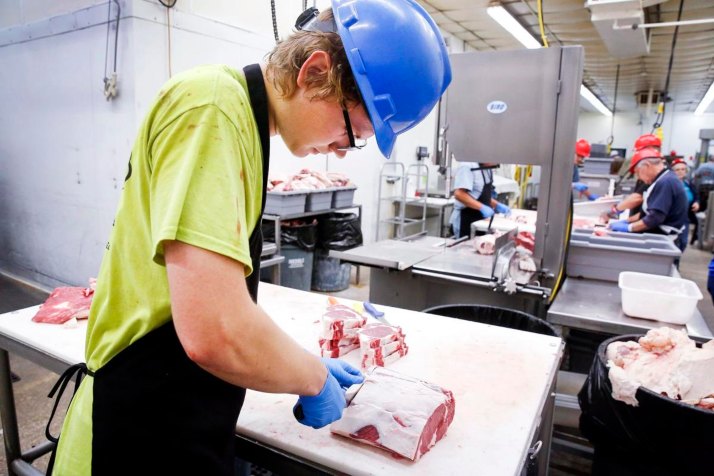Hawkeye Community College meat science program grows as lockers beef up workforce
 posted on Tuesday, September 7, 2021 in
College News
posted on Tuesday, September 7, 2021 in
College News
From inch-thick pork chops to ghost pepper beef sticks, Iowans are hungry for specialty meats they can’t buy at most grocery stores.
Iowa meat lockers that make these products are stretched to capacity and often struggle to get skilled workers. This is why the Legislature earlier this year created a task force to study whether the state should start an artisanal butchery program at a state community college or university.
“Artisanal butchery would be being able to custom fabricate what the customer wants,” said David Grunklee, dean of applied technologies at Hawkeye Community College in Waterloo.
At traditional meat-processing plants “all the chops will be cut to the same thickness, whereas an artisanal locker will ask you if you want them half-inch, three-quarters inch, an inch. It’s more about providing choices to the consumer that is having their animals processed there.”
Grunklee is one 19 people on the new task force, which will have its first meeting Tuesday in Des Moines. The group is tasked with providing a recommendation on educational offerings to the Legislature by Dec. 31.
Hawkeye Community College has offered a meat science certificate for two years, combining courses that teach students about animal physiology, livestock evaluation and food safety, among other topics. In one course, students butcher and process a whole animal into primary/wholesale cuts and retail cuts, Grunklee said. They also learn how to make specialty products, like bratwurst, sausage and bacon.
“Our meat lab is very similar to what I’d think a small local locker would be like,” Grunklee said.
Interest in the program has grown and Grunklee thinks it’s due, in part, to more people wanting to know the origin of their food. That trend is visible at some restaurants, where chefs source food locally and often list on the menu the farms where produce and animals were raised.
“For a lot of people at these lockers, they know the producer,” Grunklee said. “I might buy a pig from them, take it to the locker for processing. I get to see how that pig is raised. I get to see the condition it’s in. Not only is the food safe for them, but it’s produced in a way they feel comfortable with.”
The Edgewood Locker, with 59 full-time employees, has been doing small-scale meat processing since 1966. Located in Edgewood, the locker processes beef, pork, venison, goat and lamb for custom orders and retail, said co-owner Baili Maurer, who also is on the artisanal butchery task force.
Earlier this year, the locker started an apprenticeship program that combines hands-on work with courses at Hawkeye. Their first apprentice, Brenden Pape, started this spring on a program expected to take about two years.
“Ours is competency based,” Maurer said of the apprenticeship. “So it depends how quickly the apprentice learns the different competencies.”
During the height of the COVID-19 pandemic, some large meat processors had to close temporarily because of outbreaks among employees. That meant a backup of animals ready to be slaughtered. Meat lockers like Edgewood took up some of that slack.
“In the heat of the pandemic, people were going to grocery stores and shelves were empty,” Maurer said of spring 2020. “We small processors were able to keep our shelves stocked. We knew we couldn’t shut down. We had to keep serving our customers. We took the measures we had to take. We had to stay open for our customers.”
Maurer is hopeful the task force will listen to her experiences with an apprenticeship program and start something similar statewide to get more young Iowans into artisanal butchery.
Not only are there jobs at Iowa meat markets, but there’s room for entrepreneurs to start new lockers, Grunklee said.
In addition to the task force, House File 857 created a butchery innovation and revitalization fund to be administered by the Iowa Economic Development Authority.
The agency has proposed a program that will provide grants of up to $50,000 to eligible businesses to expand, refurbish or establish new meat processing businesses or to rent facilities to expand meat processing. That proposal will be open for public comment this fall.
By Erin Jordan, The Gazette
Tags
- Agriculture and Natural Resources
- Animal Science
- Apprenticeship
- artisanal butchery
- Edgewood Locker
- Meat Science Certificate